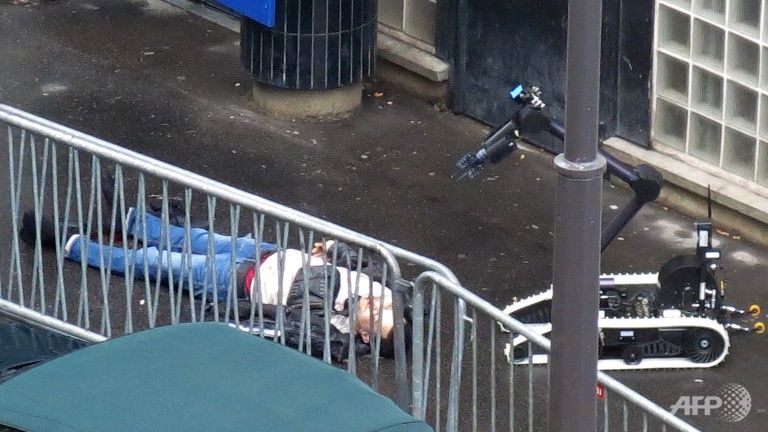Fake suicide vest attacker identified by family: French investigators
 |
| A man shot dead in front of a police station is searched by an anti-explosive robot on Jan 7, 2016 in Paris. (Photo: AFP/New York Times/Anna Polonyi) |
PARIS: The man shot dead by police after trying to storm a Paris police station brandishing a meat cleaver appears to have been identified by his family, a source close to the investigation said Friday (Jan 8).
The man, who attacked the police station on Thursday wearing a fake suicide vest, was said to be a Tunisian named Tarek Belgacem.
He was killed by officers as he ran towards the entrance of the police station shouting "Allahu Akbar" ("God is greatest"), exactly a year to the day since the massacre of journalists at the Charlie Hebdo newspaper.
Based on his fingerprints, police initially identified him as Sallah Ali, born in 1995 in Casablanca, a homeless man who was arrested for theft in 2013.
But Paris prosecutor Francois Molins said Friday that the identity he gave was "not at all certain" since he was carrying no documents at the time of his arrest.
"This identity (he gave in 2013) is contradicted by a hand-written note that we found in his clothes," Molins told France Inter radio. "He is not known to the intelligence services under this name."
Investigation sources told AFP that individuals claiming to be the parents and cousin of Belgacem have identified him from his photo.
"There is therefore a very strong indication that it is him, but it is still to early to speak of a formal identification," the source said.
Molins said the man was carrying a mobile phone with a German SIM card, with French media saying it contained several messages in Arabic, some of which were sent from Germany.
His note was written in Arabic with a hand-drawn flag of the Islamic State group (IS).
The police station is in the 18th district of Paris, an area with a mainly North African population close to the tourist hotspot of Montmartre.
Describing the attack, an investigation source said the man pulled the cleaver from his inside coat pocket as he ran towards the officers. He "did not heed the warnings, and police opened fire".
The attacker was also wearing a pouch under his coat with a wire hanging from it, but the device "contained no explosives," the source told AFP.
A remote-controlled robot was also used to inspect the body for explosives.
MILITANTS SENTENCED
A source close to the investigation said Thursday's attacker had pledged allegiance to IS leader Abu Bakr al-Baghdadi in the documents found on his body, and justified the attack as revenge for French bombings in Syria.
Justice Minister Christiane Taubira confirmed the suspect was not on the radar of counter-terrorism police.
"From what is known of this person, there was no link to violent radicalisation whatsoever," Taubira said on Thursday.
More than 1,000 French citizens have left to fight with militants, and the government has tried to deter more from leaving with stiff prison sentences.
On Friday, a French court handed two men six and 10 years in prison prison for travelling to join IS in Syria, one of whom was sentenced in absentia.
The ruling came a day after a Paris court handed a 15-year sentence - also in absentia - to key French IS member Salim Benghalem, who had ties to the Charlie Hebdo attackers.
Thursday's drama unfolded just moments after President Francois Hollande concluded a sombre speech at police headquarters to mark the anniversary of the attack on the Paris office of satirical weekly Charlie Hebdo on January 7, 2015.
Rocker Johnny Hallyday will perform at a concert in Paris on Sunday to mark a year since 1.6 million people gathered in the capital in support of freedom of expression following the deaths of Charlie Hebdo's best-known cartoonists.
With France still grieving after the massacre of 130 people by militants in Paris in November - also claiming vengeance for France's role in Syria - Hollande used his speech to call for greater cooperation between the security services.
Since the attack on Charlie Hebdo, nearly 200 people in France had been placed under travel restrictions to prevent them joining up with IS in Syria or Iraq, Hollande said.
What the stars mean:
★ Poor ★ ★ Promising ★★★ Good ★★★★ Very good ★★★★★ Exceptional
Latest News
More News
- 72 nations sign landmark Hanoi cybercrime convention (October 26, 2025 | 18:00)
- UN Secretary-General commends Vietnam’s global leadership (October 26, 2025 | 09:00)
- APEC finance ministers convene to tackle regional challenges (October 22, 2025 | 17:31)
- Rewiring global trade: ASEAN’s rise as supply chain hub (October 17, 2025 | 11:40)
- Vietnam attends first World Nuclear Week Forum in Russia (September 26, 2025 | 10:50)
- Vietnam attends 69th session of IAEA General Conference (September 16, 2025 | 10:00)
- ADB, WB pledge over 12 billion USD for ASEAN power grid, renewable energy projects (August 15, 2025 | 14:18)
- Lowy Institute proposes AI-based tobacco control solutions for ASEAN (August 15, 2025 | 14:14)
- Cloud computing policy to position Malaysia as regional hub by 2030 (August 15, 2025 | 14:11)
- Thailand, Cambodia suffer numerous cyber attacks (August 05, 2025 | 16:19)

















 Mobile Version
Mobile Version